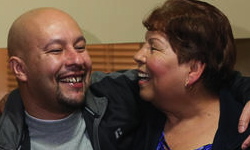 Angel Gonzalez and his mother, Maria (Chicago Tribune photo by Stacey Wescott) Sometime shortly before 10 p.m. on July 10, 1994, a 35-year-old woman was kidnapped from her apartment building in Waukegan, Illinois and driven about a mile away where she was raped by two men.
The victim said her attackers were Hispanic males in a late model dark colored four-door sedan with tinted windows.
The woman was traumatized, disoriented and scared. She wandered about for a while and approached a house, but no one came to the door. She eventually made it to a convenience store and police were summoned at 12:20 a.m.—more than two hours after the attack. After spending 15 to 20 minutes calming the woman, the officers accompanied the woman to her apartment building. Her boyfriend arrived at about 1 a.m. After hearing the description, the boyfriend noticed a 1979 Cadillac sedan with tinted windows driving out of the building’s parking lot and said he didn’t think the car belonged to anyone who lived in the building.
Police tried to stop the car, but failed. However, one officer managed to get the license plate number. Not long after, officers found the car and pulled it over. Officers handcuffed the driver, 20-year-old Angel Gonzalez, and put him in a squad car. Officers at the victim’s apartment brought her to the scene where Gonzalez, with his hands cuffed behind his back, was forced to stand in front of the police car containing the victim. She identified Gonzalez as one of her attackers.
Gonzalez was taken to the Waukegan police station and given a paper jumpsuit to wear. He was left alone until the following morning when detectives began their interrogation. Gonzalez said he and his girlfriend, Karina Cantu, spent the evening in an apartment watching television with Karina’s sister, Myrna, who lived in another part of the same apartment complex where the victim lived.
Although Gonzalez, who had come to the United States from Mexico less than two years earlier, was not conversant in English, he was interrogated in both English and Spanish. After about two hours of questioning, detectives said Gonzalez began telling a story “piecemeal” that ultimately turned into a confession.
The detectives said Gonzalez, who had no criminal record, claimed he was driving on Tenth Street in Waukegan when a man he didn’t know flagged him down and asked him for a ride to a nightclub. On the way, Gonzalez decided to stop at Myrna’s apartment. When he rang the bell, the victim came to the door instead. Detectives said that the other man then came up and they both grabbed the woman and forced her into the car and drove to Belvidere Park where Gonzalez and the other man raped her, although Gonzalez claimed he did not ejaculate.
Detectives said that Gonzalez told them he dropped the man off and then drove to Myrna’s apartment where his girlfriend was and they watched television until 1 a.m.
Gonzalez went to trial in Lake County Circuit Court in June 1995. The primary evidence against him was the victim’s identification of him and his confession—although the confession was riddled with inaccuracies. His confession said both men grabbed the victim and both covered her mouth—details never mentioned by the victim.
Gonzalez didn’t know where the rape occurred. He described a different location than the location given by the victim. In addition, the victim said she was raped in two locations. Gonzalez said she was raped in one location.
Gonzalez’s girlfriend, Karina Cantu, and her sister, Myrna testified they spent the evening with Gonzalez watching television in Myrna’s apartment. Two friends, Blanca Martinez and her sister, Marlen, testified that Gonzalez and Karina stopped by their home shortly after 8 p.m. and they were going to Taco Bell to get some food.
On June 15, 1995, a jury convicted Gonzalez of rape and kidnapping. He was sentenced to 55 years in prison.
In 2001, Gonzalez was granted DNA testing. Tests performed by the Illinois State Crime Laboratory identified a male DNA profile that was not Gonzalez. But because two men committed the crime and only Gonzalez was convicted, there was a possibility that the profile belonged to the other assailant—a man that Gonzalez didn’t identify despite going viewing several hundred mugshots shown to him by detectives.
The Innocence Project became involved in Gonzalez’s case in 2012 and, working with the Illinois Innocence Project, approached Lake County State’s Attorney Michel Nerheim in March 2013, after he took office as the newly elected chief prosecutor of the county. Nerheim, whose initial actions as Prosecuting Attorney included forming a Conviction Integrity Unit, agreed to the additional testing. Cellmark, a private DNA testing company, conducted several rounds of tests on the victim’s clothing and the rape kit.
In January 2015, the results showed two male DNA profiles—neither of which belonged to Gonzalez. When Nerheim was presented with the test results, he informed Gonzalez’s attorneys that he would move to vacate Gonzalez’s convictions. On March 9, 2015, the convictions were vacated and the charges were dismissed.
Gonzalez remained in custody because years earlier he had been convicted of damaging a sink while in solitary confinement and that sentence had not been served. On March 10, 2015, he was released after a motion to vacate and dismiss the property damage conviction was granted.
In June 2015, Gonzalez was granted a certificate of innocence in Lake County Circuit Court. Stephen Scheller, who prosecuted Gonzalez at his trial, shook Gonzalez's hand and apologized. Gonzalez was awarded $220,000 in state compensation. He also filed a federal civil rights lawsuit that was settled in July 2018 for $9.5 million.
– Maurice Possley
|